“They that be wise shall shine as the brightness of the firmament; and they that turn many to righteousness, as the stars forever and ever.” – Daniel 12:3
Henry Waring Latané Temple was born in April 6, 1812 in Essex County, Virginia, the fourth child of John Temple and Mary “Polly” Latané.
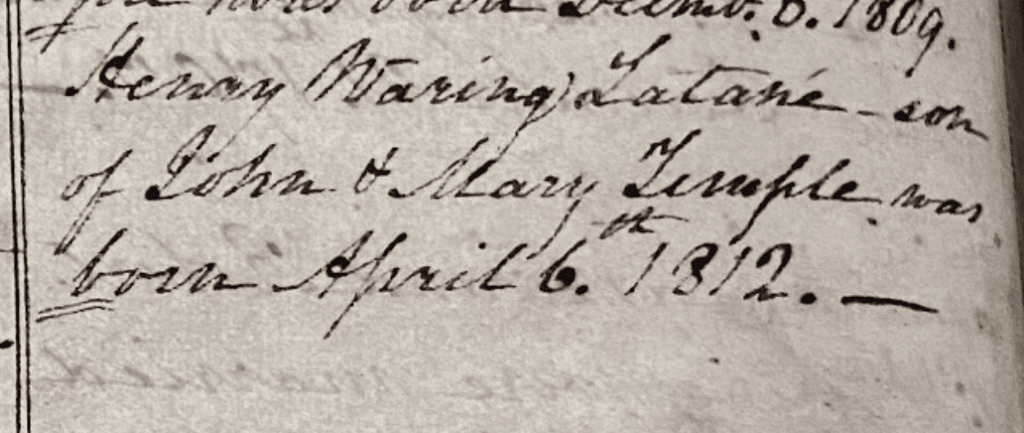
Essex County in the 19th Century
Henry was born into a Virginia culture with a traditional worldview based on faith and family. In the decades before his birth, farming of large estates in Essex County to produce tobacco, enabled by the use of slaves, had leeched and exhausted the soil. Wheat could still be grown profitably but land values in Virginia were declining, and its citizens were moving west to find new opportunities. The modernist worldview of industrial, scientific capitalism of northeastern manufacturing and worldwide trade centers was growing in influence and offered a different model of culture that challenged the traditional worldview pillars of farming, family, and faith.
Henry may have had frequent illnesses as a young boy. He considered opportunities in the military, and explored the idea of joining the Navy, but decided against it. He told his mother he wanted to find a way to contribute close to home.
The Second Great Awakening was a societal impulse of religious revival that spread through the United States from 1790 to the 1840s. Ministers were high-status individuals who could use intellectual skills to study and learn and produce guidance for their communities.
The path of a minister of the Gospel was a respected one that led to social influence in the community. By his mid-twenties, with his enrollment in seminary, Henry had determined to be a scholar and seeker of wisdom via the ministry. Even in his mid-teens, family letters reveal that acquiring and reading books was one of his passions.
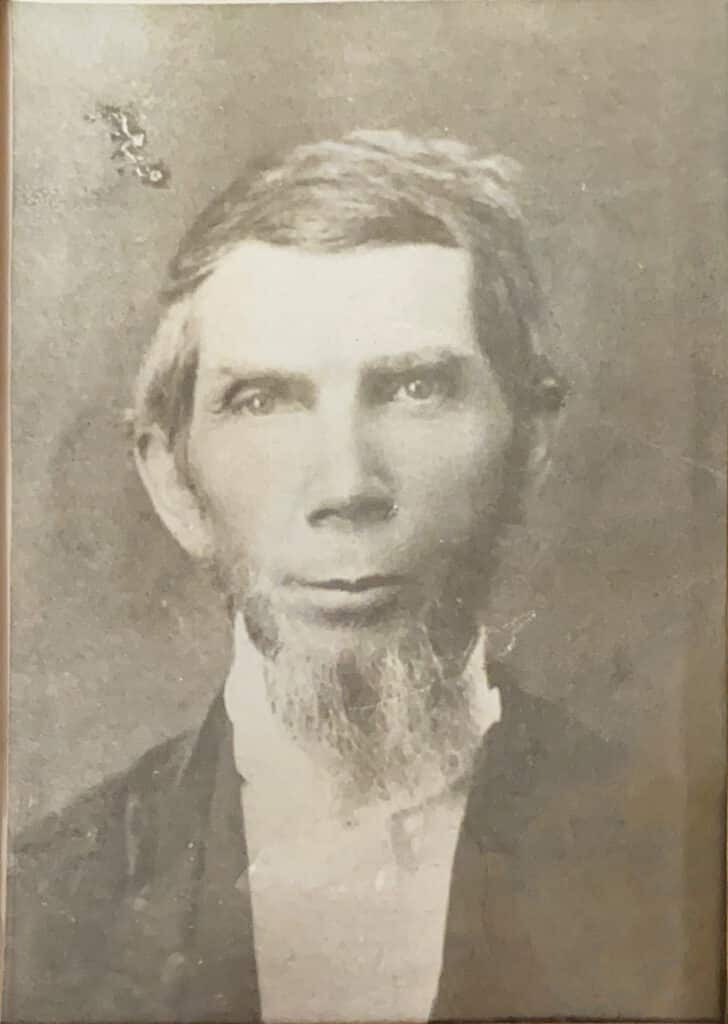
William Latané – Henry’s Maternal Grandfather
The first American immigrant of Henry’s Latané Family forbears was Lewis Latané – a minister who was a French Huguenot educated at Oxford. He immigrated to the British colony and settled in Essex County, Virginia in 1701.
Henry’s maternal grandfather, William Latane, was born in 1750 at the “Langlee” Plantation here near Dunbrooke, Virginia to John Latané and Mary Allen.
Anne Waring – Henry’s Maternal Grandmother
Henry’s maternal grandmother, Anne Waring, was born in 1747 on the “Goldborough” Plantation (later called Goldberry) here near Caret, Virginia to Colonel Francis Waring and Lucy Cocke. She married William Latané on July 5, 1776.
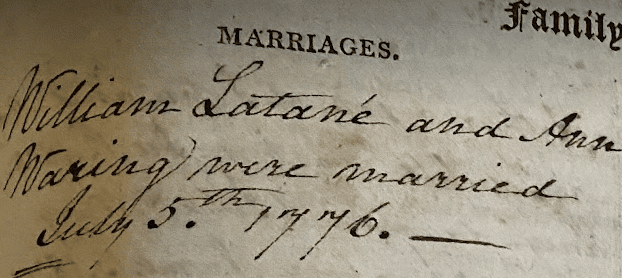
Mary (Molly) Hill – Henry’s Paternal Grandmother
Henry’s paternal grandmother, Mary Molly Hill was born in 1732 on the “Hillsborough” Plantation near Walkerton, Virginia to Colonel Humphrey Hill and Frances Brooke Baylor. She married Joseph Temple in 1750.

Joseph Temple – Henry’s Paternal Grandfather
Henry’s paternal great-grandfather Colonel Joseph Temple was born in Bristol, England in 1699.
According to a Temple-Geneaology.com entry on him:
Colonel Joseph Temple II was born in 1699 in Bristol, Bristol, England, United Kingdom.49886,102283 Year is established through the will of Joseph Temple, his father, proven 16 May 1699, naming his unborn child. He immigrated before 1722 to VA.102276 He came to Virginia as an attorney for some Bristol merchants who had established an iron works in Essex County. This is cited in Lucy Temple’s William Temple, based on a deed dated 22 Oct 1722. The first grant to Joseph Temple was 14 Sep 1726, for 1000 acres in Spotsylvania County, VA. In 1722 he was an attorney for Bristol merchants at their iron works in VA.5135 Joseph moved about 1727 in “Presque Isle”, King William, VA.102272 Eventually received grants for about 10,000 acres in Northern Virginia. He died between 1740 and 1743 at the age of 41 in “Presque Isle”, King William, VA.102271 He was a merchant in Bristol Parish, Prince George, VA.9564,102271
Henry’s paternal grandfather, Joseph Temple, was born in 1730 at “Presque Isle,” a plantation in King William County. To give historical context, George Washington was born in 1732. Joseph Temple achieved the rank of colonel. He died at their plantation named “Chatham Hill.”
According to a Temple-Geneaology.com entry on him:
Colonel Joseph Temple III was born about 1730 in King and Queen Co., VA.40880,76757 He lived in “Chatham Hill”, King and Queen, VA about 1750.100024 Joseph built “Chatham Hill” near the bridge at Ayletts, Virginia. He Granted 460 acres in St. John Parish on 14 July 1757 in Pasquotank Co., NC.102287 Grant from Lord Granville. Joseph served in the military in 1758.102288 He was a Captain of the Rangers. Some sources credit this service with his father, although the disparity in their ages argues more for this Joseph than his father. He member of the King & Queen County Committee of Safety in 1774/5 in King and Queen Co., VA.100024,102289 Member of the Society of Cincinnati. He appeared in the census in 1787 in King and Queen Co., VA.100024 Appeared with himself and two males 16-21, who were likely to have been Humphrey and Joseph. Joseph appeared in the census in 1790 in VA.100024 Listed with 6 whites in the household, but no designation of sex. He appeared in the census in 1810 in King and Queen Co., VA.100024 Appeared with himself, over age 45, and 1 male 16-26. Also shown were 2 females, 26-45, one of whom may have been his daughter Elizabeth. He died on 15 December 1819 at the age of 89 in “Chatham Hill”, King and Queen, VA.40880,100024 Rise of the Temples incorrectly gives abt 1790. Joseph Member of the Society of Cincinnati. The surrender at Yorktown, VA, occurred on Temple Farm, being land probably owned by Joseph or his sons. He was listed as living on the north side of the North Anna River in St. George’s Parish of Spotsylvania County.
Henry’s father, John Temple, was born in Walkerton, Virginia in 1771. His birth year is established by an entry upon his death in the Latane Family Bible that reads “Departed this life May 20th 1812 Mr. John Temple in the county of Wood aged 41.” To be aged 41 in May 1812 means John was born in approximately 1771.
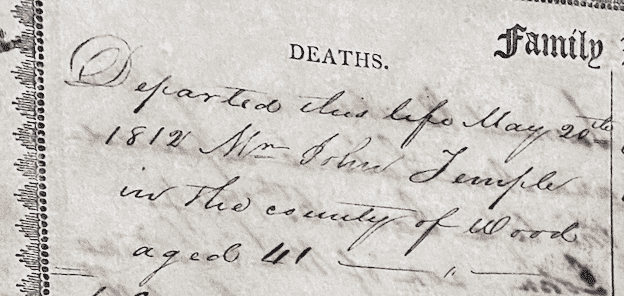
A month after Henry’s birth, when Henry’s father died he was in Wood County in what is now West Virginia. When he died in was exploring opportunities in the western edges of the colony, like so many other Virginians, and was perhaps preparing to seek property even further west.
Upon John’s death in 1812, Polly, aged 26, found herself with a 1-month-old Henry and 3 other fatherless young children: 8-year-old Arthur, 5-year-old Lucy, and 3-year-old John. Though she & John had already received her inheritance as a dowry upon their marriage in 1804, her father, William Latane, proposed redividing his estate de novo, to allow her to have a portion of the Latane Family lands to support them. Mary’s [siblings agreed, and some land was set aside for the young family.]
In 1835, Wayland was given to H.W.L. Temple by his uncle Billy, William Catesby Latane.
Here is a video that shows the site of the Wayland residence:
Henry as a Young Man
What we know about Henry’s early life are impressions from Temple Family letters recovered from Wayland in about 1965. My grandfather Thomas Lewis Latane Temple III and his sister Helen Temple Allan visited Wayland and found these letters in the deteriorating building. They were finally transcribed in about 1992 by Carolyn Allen Alevra with assistance and annotations from Lucy Temple Lewis Fish.
In 1826, at age 14, his mother Mary described Henry as being impatient to receive books he was interested in. She mentions he “will always have that spirit.” In the same letter, he is described as being very sick for several weeks on a vacation from school.
In 1827, his brother John writes from school at the University of Virginia in Charlottesville, with surprise, that 15-year-old Henry has “abandoned all ideas of going into the Navy.”
Brother John died of illness in the summer of 1828 at age 18. John was a pious young man who was an old soul, whose letters to home were read aloud to the younger members of the family, decades after his death, as examples of virtue.
Henry may have had a wild and free period of his youth, if this recollection of him from Temple-Geneaology.com is accurate:
Henry was born in 1812 in VA.45404,45405,77119 He appeared in the census in 1840 in Essex Co., VA.77118 Enumerated with his wife and 1 female age 50-60, possibly one of their mothers. In November 1850 he was a minister in Essex Co., VA.45404 In July 1860 Henry was an Episcopal minister in Essex Co., VA.45405 In August 1870 he was a minister in Miller’s Tavern, Essex, VA.77119 He died on 13 February 1871 at the age of 59 in Fredericksburg, Spotsylvania, VA.95524,95525 May have died in Alexandria, VA. Henry has reference number RLT # 79Bi.4455 Reverend Temple was engaged to Alice Peck, daughter of John and Ann (TASKER CARTER) Peck. She unfortunately died before the marriage. The following story about Reverend Temple in his later years is recounted by Miss Milsted, an owner of the Bladensfield home of the Pecks:
My favorite story was of Miss Alice, the beautiful daughter of old John Peck. My mother used to tell us of her reputation for beauty and goodness. She had a lover who was a very wild, dissipated young man, much given to horse racing. Miss Alice loved him but refused to marry him until he had reformed his life. He left and she went on a visit to the mountains from which she returned ill with the fever that brought her death.
When she was dying her lover came back and tried to tell her something, but she died holding to him and trying to listen…The servants always said that that was why she could not rest – she had not heard – and so she was always wandering about the place…She was the loved companion of our childhood.
One day, a gentle, old clergyman came very unexpectedly to visit us. My mother put him to sleep in our guest room which was the room in which Miss Alice died. In the morning this old gentleman rose by the light, and wandered all over the place. At breakfast, my mother said, ‘Mr. Temple, I am afraid you did not rest well, you got up so early.’ Mr. Temple answered, ‘Madam, I could not sleep in that room.’ My mother said, ‘Oh! I am so sorry I put you there to sleep!’ He answered, ‘I am glad. I would not have missed it for anything.’ My mother remembered that Mr. Temple was Miss Alice’s wild, young lover.
The Pecks lived at a farm named “Bladensfield” about 3 miles north of Warsaw, Virginia on the Northern Neck peninsula, across the Rappahannock River from the vicinity of Miller’s Tavern. Horse racing was a popular pastime among young people of the time, and though most of the reports of Henry are of a serious, studious, and sober, we’ve all been young. Also, there may be some exaggeration in the above account to make for a better ghost story.
We do know that in 1829 at age 17, Henry was enrolled as a freshman at Harvard. In an 1846 letter to his sister, recalling those college days, he suggests she go visit his former lodgings at Massachusetts Hall:
“If you go to Cambridge you may know the building that I roomed in by asking any one in the college yard which building is called Massachusetts. It is with the library which it fronts, the oldest building on the ground. I hope you may get into the library. If you go after getting there (as I suppose you might when I wrote the above) do not fail to get sight of the Episcopal church. It was built, I have understood, before the Revolution.”
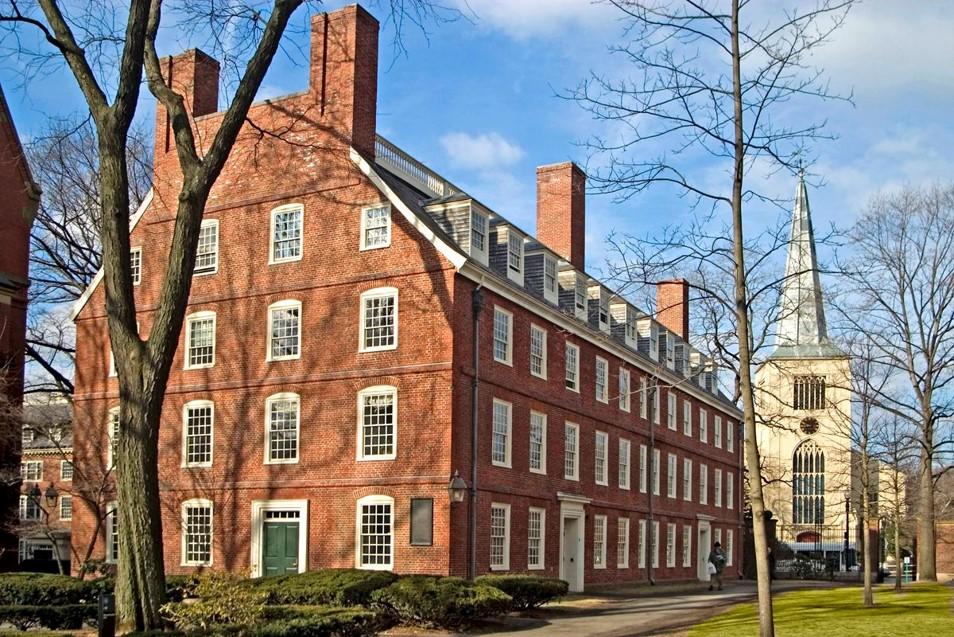
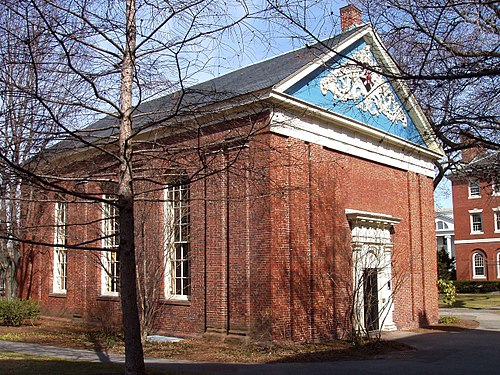
The Rector’s Assistant
In 1837, the vestry of South Farnham Parish sent 25-year-old Henry as their lay delegate to the annual diocesan convention in Petersburg.
Henry is introduced in A History of St. Paul’s Episcopal Church by E. Lee Shepherd in the following paragraphs:
According to the surviving minutes of the South Farnham Parsh vestry, H. W. L. Temple had first been elected to the administrative body in 1833, when barely twenty-one years old. Born 6 April 1812, he was the fourth and last child of John Temple of “Chatham Hill,” King and Queen County, and his wife, Mary Latane of “Langlee.” John Temple had moved his family to western Virginia when Henry was young, perhaps in anticipation of settling even farther west. He died in Parkersburg in 1812, however, and after his death his wife’s brother, Henry Waring Latane, sent slaves and wagons to bring the widow and her children back to “Langlee.” Later, Henry Latane built “The Meadow” in Essex County, to which he moved his sister and her family. There, Henry W. L. Temple lived until 1835, when his bachelor uncle, William Temple, bequeathed him the “Wayland” plantation, roughly northwest of Miller’s Tavern. He moved his mother and sister there shortly afterward.
Henry Waring Latane Temple was a religious young man. Completely devoted to his family, he once told his mother that he sought no pleasures that could not be found at home. He had attended Rumford Academy in King and Queen County in the 1820s and later graduated from Virginia Theological Seminary in Alexandria in 1841. Always of somewhat fragile health, he found that both his temperament and his physical makeup suited him for work in the church, but rather than travel far and wide in search of an open rectorship, he concluded as a young man to devote himself to the service of the Lord in Essex County. He would become not only a valuable assistant to the Reverend Mr. McGuire, but also serve for many years as the spiritual leader of the congregation at St. Paul’s.
Doubtlessly, Temple’s residence at ‘Wayland’ and thus his nearly constant presence in South Farnham Parish aided John Peyton McGuire both in ministering to the communicants in that part of Essex County and in developing and maintaining a high enthusiasm for the contemplated building project near Miller’s Tavern.
p. 67-69
Funds were raised for a church that would become St. Paul’s Episcopal Church. In an 1838 ceremony, a cornerstone was laid and Rev. John McGuire delivered a sermon celebrating the occasion. In 1840, Assistant Bishop Meade consecrated St. Paul’s.
“As the 1840s progressed, John P. McGuire… came to rely more and more on the aid of his colleague Henry W. L. Temple. The Reverend Mr. Temple he was now, for he had been ordained a deacon by Bishop Moore in July 1841 and added to the list of diocesan clergy, although without an official assignment. He assumed an active role in South Farnham, giving special attention to the African-American population in the eastern end of Essex County. McGuire noted in 1843 that the “religious interests of the colored population has attracted more attention. In [South Farnham Parish], Mr. Temple labors for their benefit. Good has already been done, by the implanting of divine truths in minds greatly in need of such instruction, and it is hoped that it is the beginning of an important work.” Some tangible evidence of Temple’s success appeared in that year’s parochial statistics, which included the baptism of nineteen African Americans in South Farnham.”
Henry W. L. Temple’s first official report as the new assistant rector of South Farnham Parish. “To this office he was elected in January last,” Temple wrote of himself. “Since the time of his accepting the assistant rectorship… he has preached less frequently to the servants, but more regularly in the churches of the said parish.” Temple also preached once a month at Acquinton Church in King William County and took charge of the local Bible Class, but he still found time to devote to the ministry among local blacks. “He trusts good has been done,” he concluded, “by the religious instruction imparted to the colored people from time to time, particularly the young.”
In the wake of the opening of St. Paul’s Church, and with the growing presence and influence of the Reverend Mr. Temple in the eastern end of Essex, diocesan leaders detected a palpable resurgence of the Episcopal Church in the county.
p. 86-89
In one letter without a year date, a neighbor Mr. Upshaw requests that Henry “would go to see his son who he said he thought sinking very fast he thought he could not stand his suffering.” So Henry is performing a pastoral role, visiting the sick and offering spiritual guidance.
In 1841, at age 29, he graduated from Virginia Theological Seminary in Alexandria, Virginia.
In an undated letter, Mary Temple reports to her nephew Thomas Lewis Latane that “I expect you have been told Henry preaches much more than formerly, he preaches at St. Pauls, Tappahannock and at the Aquinious church in [ ] and he participates in the morning prayer.”
Learning The Role of a Minister of the Gospel
In a letter of 1846 to his sister Lucy, Henry asks her, while in New York, to “get for me, of J.C. Riker Bookseller & Publisher ‘The Preacher’s Manual’. He sent me a prospectus of the work. It does not say in what part of N. York he is but this you can see from a directory. I should prefer the cheapest form.”
Selected Paragraphs from the Manual
Reading selected passages from the Introduction, you can imagine how Henry might have taken many of the author’s calls to action to heart. Here are a few notable sentences:
- Thus man becomes extensively a greater blessing to man, by communicating that which brings them more on a level in the knowledge of the things of God and of virtue, thereby being instrumental in bringing many into a social, godly, and happy state, who were before lost to such enjoyments.
- Hence infinite wisdom has appointed the public proclamation of the gospel viva vice as the grand engine for evangelizing the world.
- Here then the intelligent preacher stands confessedly distinguished as the most important character on earth : imbued with the spirit of that gospel which he is commissioned to declare, and replete with capacity for thought and ability for utterance, he pours upon the waiting ear the treasures of wisdom and knowledge drawn from the fountain of eternal truth, by Christ’s own appointment
- As the ministers of Christ, you are justly expected, not only to preach the gospel, but also to be leaders and patrons of benevolence in its universal sense. Is not this love “the fulfilling of the law”—the first of virtues?
- The stated duties of a minister call for the exercise of great wisdom, a strong and piercing insight into human nature, through all its labyrinths, and all the varieties under which it appears.
S. T. Sturtevant (2018-07-09T23:58:59.000). The Preacher’s Manual: Lectures on Preaching, Furnishing Rules and Examples for Every Kind of Pulpit Address (Kindle Locations 304-310). J.C. Riker. Kindle Edition.
Henry and Susan Temple in the 1840s
In 1843, when Henry was 30 and Susan Jones was 18, they were married. Susan grew up just a bit south of “The Meadow” on a farm named “Retreat.” She and her sister Mary Ann were orphaned in 1837 when their father Thomas Jones died.
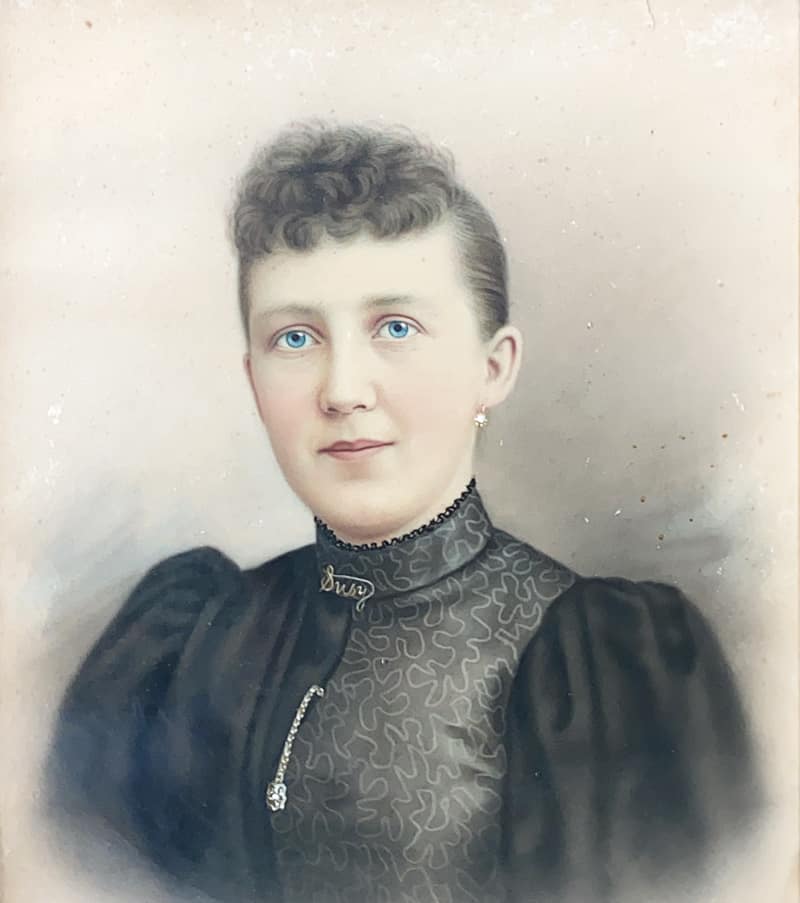
In a 1846 letter, at age 34, Henry writes to his sister Lucy about some deaths from illness of cousins in the family. He says of their sudden passing, “I trust such calls to be ready also will not be unheeded by us.” The prospect of preparedness for judgment is in mind. He officiates at burials, reporting: “We all went to the Meadow Saturday evening, where I read the burial service, and some of the company to the grave. I could but hope & think that the services on such an occasion might be blest? to some of the many young persons who were present.”
After losing two sons in infancy to illness, beginning in 1847 until 1861, from age Henry at age 22 to age 36, Henry and Susan became parents every two years to: John Newton Temple, Mary Temple, Lucy Ellen “Loulie” Temple, Susan Matilda Temple (who died in infancy), Charles Henry Tilghman Temple, Anna Waring (Nancy) Temple, Thomas Lewis Latané Temple, and William Temple, and Susan Temple (who died in infancy).
In 1848, after a visit to Tappahannock from Bishop Meade, Henry’s wife Susan Jones Temple reports that Henry is trying to use the momentum to increase the spirit and number of the faithful:
“Henry went to Tappahannock Saturday evening and has not gotten back this morning: – he has been diligent endeavoring to turn to the very best account the impressions left after the visitation of Bp. Meade: – he has given the people of that place line upon line – there has been and I hope still is, a hopeful state of things among them – both old and young – I have heard of but one conversion a Miss McCarty – Mr. Carraway so kindly remained after all others left and preached for them – I hope the Lord may point at the judgment to jewels gathered in consequence of his faithfulness – another visit from him will be gladly looked forward to”
The Reverend Temple in the 1850s
St. John’s Church in Tappahannock was constructed in 1850, funds were raised for a thorough repair of St. Paul’s. Henry shepherded three Bible classes and a Sunday school, superintended the construction of St. John’s Church, and actively ministered to local blacks.
In September 1852, Rev. McGuire, Henry’s mentor, resigned to assume another rectorship, and Henry accepted the role of rector of South Farnham Parish. As Shepherd describes:
The personality and demeanor of this new rector, now in the 40th year of his age, match the solemn tone of the vestry that appointed him to the vacant post. Henry Temple took the duties of his new charge seriously, as seriously as he took his calling to be a minister of the gospel in general. The vestrymen of South Farnham Parish had known this man for many years – he was kin to a number of them. They had witnessed his spiritual and ministerial growth while an assistant to McGuire. They were comfortable with this man who in recent years had progressively undertaken more and more of the pastoral tasks in South Farnham as McGuire had turned his attention to the demands of his ministry in other spheres.
Shepherd describes his work in the 1850, noting letters that Henry wrote to friends on the matter of their salvation:
This expression of personal concern for the spiritual welfare of one individual was indicative of how the Reverend Mr. Temple saw his whole mission laid out before him. In many ways, he was a driven man: driven to serve faithfully the congregations under his care: driven to extend the gospel to the African-American community around him; driven to meet the spiritual (and the physical) needs of those persons he met in his travels on behalf of the church. And although his own fragile physical condition would be often tested by it, his commitment to this personal and professional mission was determined and complete.
Henry Temple set about his new tasks in September 1852, instituting a meticulous record-keeping system and methodically organizing his various responsibilities into manageable units.
p. 96-97
The Civil War and Post-War Years
In the 1860 Census, it is revealed that Henry was a slaveowner. He is listed as owner of 43 enslaved people and the property had 10 slave houses on it. My assumptions about the ministry make this surprising, though I also should not have been surprised. He inherited farmland in Virginia and with that farmland he inherited slaves. As a minister of the Gospel, this is difficult to reconcile human bondage and the ways of mercy. We know that his ministry to the black population of the parish was a key part of his work, but for some reason, extending this charity and generosity to include actual freedom for slaves did not happen. So when the Civil War came, we can assume he sympathized with the Southern side.
Through the war, Henry offered what guidance and comfort he could to his congregation as they suffered through hope, fear, deprivation, and loss. Statements from the church at the time reveal they sought to guide behavior with apolitical Biblical teaching about the path of salvation.
In January 1864, when Henry was 51, his wife Susan died at the age of 39.
On June 2, 1865, the Civil War ended with Confederate surrender. For Virginians, the defeat and the end of slavery changed everything, and many young and old Virginians looked to either reestablish farming operations with hired labor or head west.
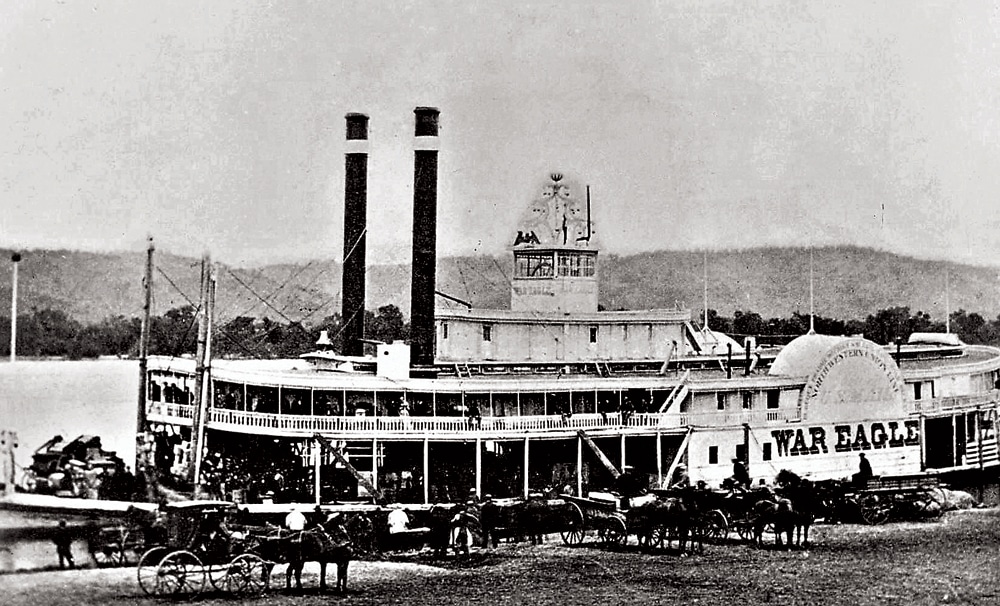
A Letter and a Travelogue from a Trip Arkansas
Henry went to Arkansas to help process an estate that Susan’s uncle, Orlando S. Jones, had bequeathed to Susan. Because of her death, the bequest went to Susan and Henry’s two oldest sons, John Newton Temple and Charles Henry Tilghman Temple, 18 and 10 years old at the time.
In a letter from J.W. Bill Temple, the grandson of Charles Newton Temple, the describes the location of the land:
“if one looks at a map of the four states area surrounding Texarkana, the Red River runs generally in a easterly direction, separating Texas and Oklahoma, before entering Arkansas a few miles north of Texarkana. In a few more miles, it then bends 90° south and exits to Louisiana. The above plantation lay on the north bank of the river before it bends to the south. At that time it was in Sevier county, but as Arkansas became more populous, parts of Sevier were obviously divided into new counties, and the land now lies in Little Rock County.”
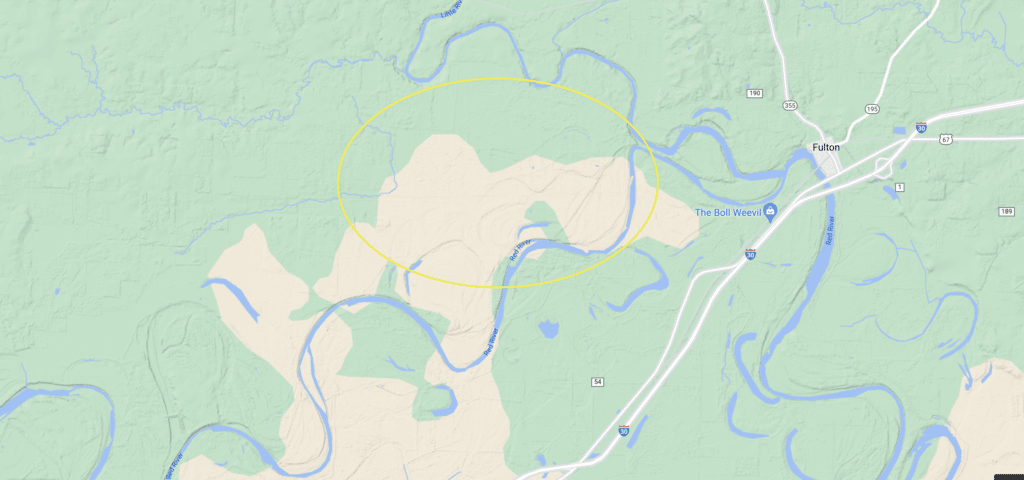
Bill Temple also describes Dr. Jones:
“Dr. Jones, a bachelor, was an MD and native Virginian, who apparently had an adventurous in nature. He obtained the above mentioned land by grant in 1840. He also had a plantation in Louisiana. His 1861 will bequeathed the Arkansas land and slaves to his niece Susan Jones Temple, and the Louisiana land and slaves to another niece, Mary Ann Jones Wright. There was also a stipulation that each of their deaths their bequest should be divided between the two eldest sons of each. Both of their husbands were named as executors, but the probate additions at the bottom of the will indicate that Mr. Wright predeceased Dr. Jones.”
Henry traveled down the Mississippi from New York to New Orleans as executor of the will of Dr. Jones. Then on another steamer, he headed back north on the Mississippi to Baton Rouge and then moved up the Red River to Shreveport. He then took a cart 126 miles to the vicinity of Clear Lake, Arkansas.
Here’s a letter from Henry to his daughter Mary (Polly) that records the journey:
Dear Polly
Nov 3. [1865] Yesterday was a lost day to me. It was a rainy day and I was unwell. I do not know whether I had staid out in the air too much the day before as we came up the Mississippi from N Orleans, on which I had indulged rather too freely in the good things which are supplied us or both. However this be, I was quite unwell, & had to keep [to] my room & my berth almost constantly. You will think, [that] my situation was such as to make me very unhappy. Thank God not so. I was disposed to sleep, which relieves me usually, when not well. And when awake could say “in the multitude of my thoughts within me, they could only delight my soul.”
We are now going up Red River, which you must see on yr map empties into the Miss. There are several falls in this river. We have not long passed the worst. Over these you know the river passes rapidly & certain means have to be employed to [ascend] them. Two very large ropes are carried from the steamer, & made fast on shore – one of them is intended to draw the craft forward, the other to prevent the tendency to the opposite shore. They are then wound up by a capstan, as called – which is turned by the machinery of the boat. We were a long time getting over these last; for a great deal of coal & skillful management was required & executed by a person who neither swore, nor lost his temper.
There are two little boys on board about the age of my little William. As you may suppose, I am attracted to these. There are quite a number of ladies. They occupy a saloon in the kinder part of the boat, and it is in that, I am writing. The boat shakes so, it is not very easy writing. I have just come from the upper deck where I saw some persons with mules on land, & passed a boat downward bound. The salutations of these boats as they passed each other is by a howl made by [letting] the steam through a tube, ending like a horn. They intend it I suppose for a blast like that from a horn. It is most unearthly in its sound.
But the passengers of the steamer are very interesting, & [imposing group). They are frequently
[passing]; for this is a great country above and a vast amount of produce – the war notwithstanding – is brought down. Cotton tho. is the great staple, and loaded to the water’s edge [with this] article, but in miserable condition. The bales often are secured with [ ] instead of sacking as formerly.
Nov. 4. Today is very bright & beautiful and the air is clear & bracing. I trust it will contribute to health. I am again in the room with the ladies though I do not know one of them. But that does not disturb me at all, & I feel very sure I do not disturb them. They are a great company.
I hope you may be useful to Mrs McGuire, I’m sure you will if there be any way in which you can. I want you to try & exercise yr memory so as, in time to be able to recollect things, which now you would perhaps, but fail to do – such as my towels. I have done pretty well without them; but would have been very glad of them. Exercise is the way to improve the memory, and I will tell you of one other thing which I hope will do you good, & that is, to know thoroughly what you study. I believe you will duly apply yourself. While doing this, give your mind to the subject. And may God bless you in preparing yourself forever fulness.
I hope you will visit friends in Tappahannock & give my love to them. [How I ] to know how you get on at [sacraments]. I hope Mr. McG has [ ] or that Mr. [ ] has and as to service at st. Paul’s [ ] and I. [ ] to know that Mr McG had been there or that uncle Arthur has held services. I [learn] this without the good Lord.
The boat which we are on, I am informed was in the war – a gun boat, & having served in that capacity, has been by private enterprize converted to her present use – a good change we would say. I have now been on her since about 4 o’clock Tuesday evening with the little interval which I mentioned – when I stept ashore – and have become so well used to her that it is almost a feeling of attachment. We were from Sat evening 3 o’clock 21st to Monday 30th [ ] the ship on which we came from [N.Y. to N.O.] it seems as if we may be nearly as long on this [ ] [ ] or [ ] & I will [ ] particularly [ ] It may be that I may do good on board tomorrow; & after [ ].
Nov 5. Today is again the [Sabbath] the third since I left home. It is a bright & beautiful day [upon the frost while after sunrise] [ ] pleasant service it was, a [ ] I am pleased to see the outward observance at least of Lord’s day. No card playing, nor drinking, that I have seen. Thank God for it. I have made the very pleasant acquaintance of a lady on board which adds not a little to the agreeableness of the trip. I hope to have another service this evening. Just had it. Good bye my daughter.
[Yr] Father
A Letter Home to Daughter Mary (Polly)
Clear Lake
Sevier Co. Ark
December 7, 1865
Dear Polly,
You see, I am here still, but I trust, it is of the Lord, and I would acquiesce in His blessed will; knowing assuredly, that, what He ordains is best, tho: we may not see. This belief, supports & comforts me in absence of all information from home. I am still without a line from any one, and although should be greatly pleased to hear, will not be uneasy. I wrote that, I expected to leave for home about this time, and so intended to do.
A young man from Washington – the same who drove me here when I first came, has been employed to drive me now to Shreveport. We set off this morning with a fine pack of mules – thinking they would be more reliable than horses – and a good strong buggy, had proceded some two miles, when we came to the conclusion ‘twould be better to turn back, & wait for the road to dry & settle – so heavy were they after several days rain we have had here. As the week is so far advanced, to avoid travelling on Sunday or being detained on the road that day I think it best now, to remain satisfied until Monday of next week. Not so my driver. He is a restless fellow, unable to fix his mind on any thing for five minutes. He tries to read one thing & another, but fails of being interested in any.
What a misfortune this is, and how does it show the great importance of being able to find within one’s self the satisfaction which is generally found in extraneous things. Some persons and they are those whose minds have been properly trained, & whose principles properly cultivated & fixed who are happy under all circumstances – others again, can only be satisfied by drawing upon resources external to themselves, and uncertain as to their supply. These cannot be relied on.
DEC: 8
The recent rains may cause the river (Red) to rise sufficiently for boats to come within a short distance of this place. If so, I should greatly prefer taking one to going by land. I should regret exceedingly for any thing to happen to the buggy & mules. The buggy is a very nice one with good leather top & other appurtenances, and as it will be of little value to the estate, I want the Administrator to sell it. Young Mr. M Lendon will purchase it , or expects to do so , and
playfully charged me to be careful in the use of it.
Thompson thinks this is a sign of his intended marriage. I hope it may be, if judicious as it would have the effect of settling him. He is not so now – talks of removing to some other country, which I hope he may not do, as neighbours are few now, and good ones fewer still. Trust he may not leave the party. I have before mentioned him & his father. Indeed he is the young man cousin Robert Wright met with. I dined with them one day this week, and for dinner was a very large wild turkey, which I enjoyed much. This country abounds in game of almost every kind. Bob, the man who rides a mule, & attends to the stock, and spends some of his time in shooting, came in yesterday morning with nine ducks, killed at one shot. They were of what are called duck & mallard – six drakes & 3 ducks. The plumage of the former was very beautiful. I spoke for the scalps & portion of the wings for you & Luly & Anne but they had been thrown away. Oh! the waste of everything here. It seems a fixed habit. There is no idea of economy in the use of any thing. Would to God, I could impress upon all, not only the importance but the duty of taking care of what a kind Providence has given to be used without being abused, as is done, when wasted. I rode yesterday evening, & found in a house some two miles off, & in a remote part of the plantation corn of the crop of last year if not year before left, while the new crop is being most lavishly used. I spoke of it in the absence of Thompson – he had to leave home again on business of the estate – and it is being brought to be used instead of new. In this way & many others, I hope to be useful.
I wish much, I could know of you, in respect to your school – how you are doing – well, I hope, and improving the time. I do not doubt as to your desire to do this, & your effort to do it; but I must again tell you of the great importance of thoroughly comprehending what you learn. This is done in great measure, by going to your studies, not as a difficult task, but to be mastered by a good will and unremitted attention – not letting the thoughts wander on something else, and the energies of the mind thus dissipated, as we say. For lack of this concentration of the mind, much is lost in study. Going through many books, & not thoroughly comprehending them is very unprofitable. I pray you avoid it. And may your good desire to improve, and effort to do so be abundantly successful.
My kind regards to Mr McGuire & all his family. I trust his school has gone into successful operation. God, I believe will bless him & his, according to his promise to the righteous.
I hope you find time to visit the friends in Tap: It will not only gratify them but benefit yourself. The weather has clouded up today, showing it was wise to turn back, yesterday. I will wait patiently for Providence while I [greatly] desire to be returning to loved ones at home. Would that it were so, I might prosecute my homeward journey without interruption. But, I feel loath to return without having done any thing for aunt Mary Ann; for if nothing be done now, great loss may accrue, from its being supposed quiet profession is given. There is a portrait before me, and to the life, of old Mr. John Jones, which used to hang in the parlour at Doct. Minors. I have felt toward it as an old acquaintance – remembered it, as soon as I laid eyes on it.
DEC 9.
Had a pleasant ride this morning and a 2nd this evening on Clear Lake. The weather has been very fine today & I hope the roads improving. There is a gentleman here tonight who will take this to Washington to be sent to Little Rock by first opportunity. Let me add for brother who I hope is getting on well with the hands, that they had better continue with him until I return even should I be unable to return before the first of next year. May God bless all.
Yr affectionate Father
In 1866, in a letter to Henry’s daughter Lucy a cousin heard that Henry enjoyed the trip:
“Through most uncertain and unreliable sources, I have heard occasionaly from you, that cousin Henry had returned so much pleased with the west he wishes to move out there”
In the 1870 Federal Census, living at Wayland are Henry (58), Mary (21), Lucy (19), Charles H.T. (15), Ann W (12), Thomas (11), William (9).
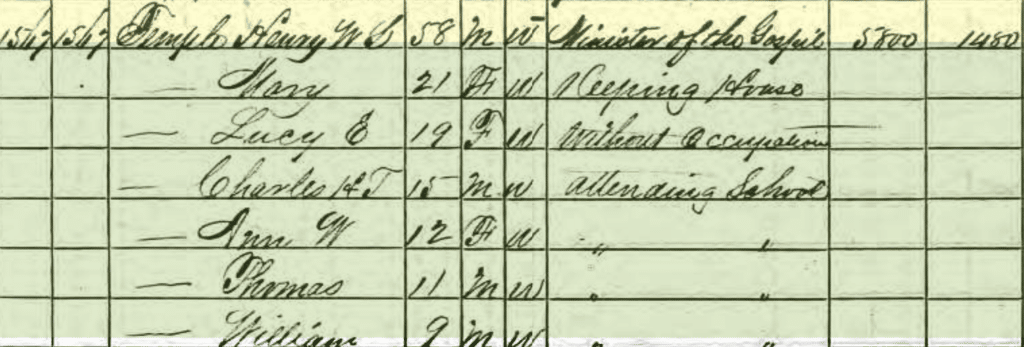
The Latane Family Bible
Here are the pages from the bible: